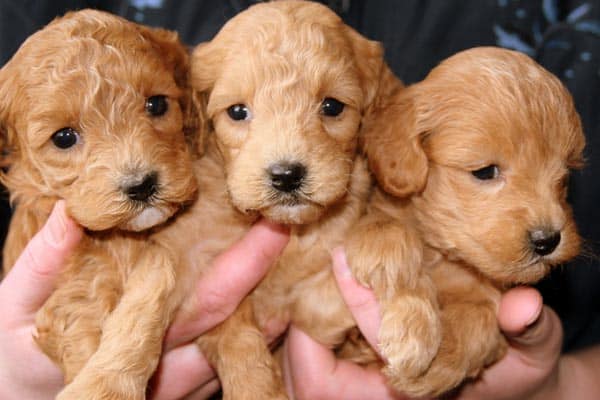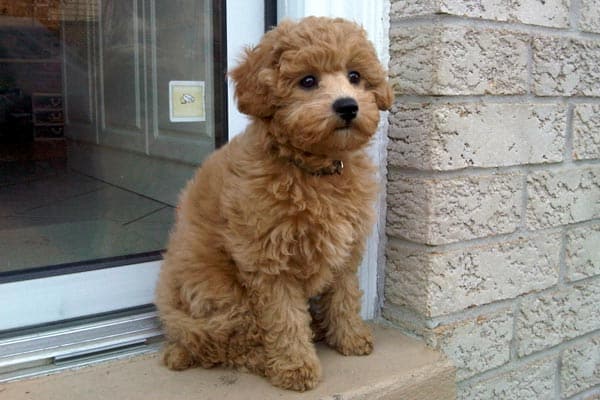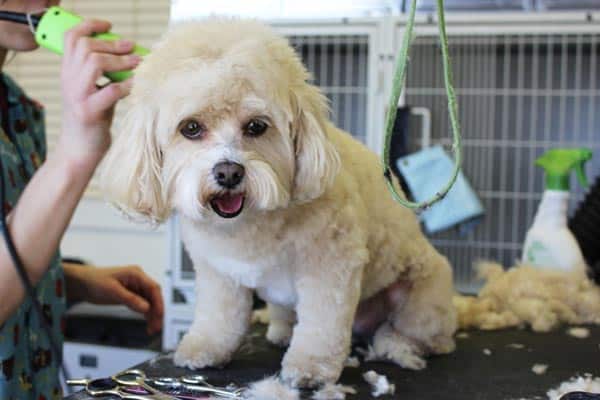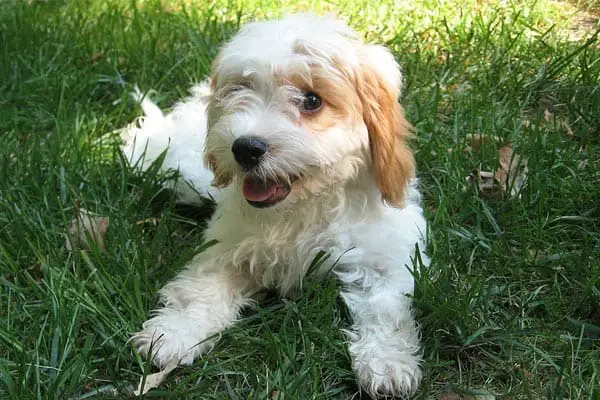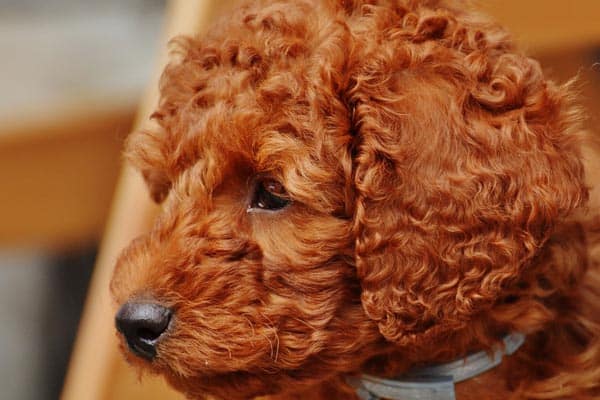What’s the Difference Between Cavachon and Cavapoo Puppies?
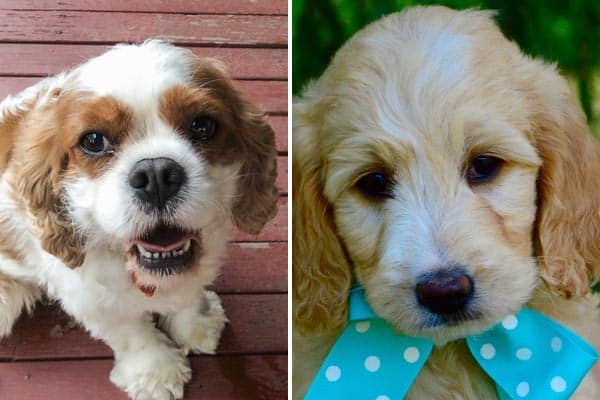
Would you like to bring a puppy home that is small, adorable, soft, and fluffy, but you’re not sure whether you should choose a Cavachon or Cavapoo?
If so, ask yourself the following question: Do you prefer an extremely energetic dog or one that is calm and laid back?
If you answered “Yes” to the former, you may tend to do better with Cavapoos since they’re usually far more energetic than Cavachons and require a great deal of exercise and mental stimulation.
Yet if you answered the latter in the affirmative, you may be partial to Cavachons since they’re much more relaxed and like to spend the day napping and snuggling with their favorite humans.
Below, we’ll discuss several characteristics that both of these adorable dog breeds share as well as important differences.
Hybrid Dogs
Both Cavapoos and Cavachons are hybrid dogs, also known as designer dog breeds. In other words, they are hybrids that result from controlled crossbreeding between two purebred dogs.
Hybrid dogs have two purebred parents that are usually purposefully bred to obtain the most desired characteristics of both breeds.
Cavapoos and Cavachons have one parent that is a Cavalier King Charles Spaniel–hence, the “Cava” prefix in both hybrid dogs’ names. The Cavalier King Charles Spaniel descended from a Toy Spaniel highly favored by British Royalty–most famously by King Charles II.
This Toy Spaniel was crossbred with Asian dog breeds, thought to include the Pug and Japanese Chin. The result was the Cavalier King Charles Spaniel.
This breed is popular due to its playful, affectionate, and friendly demeanor; big brown eyes; and ability to adapt easily to new environments.
The Second Parent
For Cavapoos, the second parent is a Toy or Miniature Poodle. Bred to hunt fowl, Poodles are intelligent, easily trained, active, energetic, and obedient. In addition, they require mental stimulation and attention.
Poodles are considered the most hypoallergenic and lightest-shedding dogs belonging to coated canine breeds. Poodles are gentle, sensitive dogs that may startle easily due to sudden, loud noises. Since they prefer peaceful environments, they may not do well with small children.
A Cavachon’s other parent is a Bichon Frise, a small dog with a white hypoallergenic coat that is soft and velvety. They also tend to have rounded head hair and large, dark eyes. They’re affectionate, curious, alert, and playful with strong, sweet, “happy-go-lucky” personalities.
Why are Dogs Purposefully Crossbred?
The primary reasons for crossbreeding designer dogs include the following:
“Hybrid vigor,” which is the belief that breeding two purebred dogs result in healthier puppies.
Evidence suggests that designer dogs are usually slightly healthier than their purebred ancestors resulting from a larger gene pool and wider genetic diversity, increasing the chances that positive traits are inherited. (However, some breeders disagree with this concept.)
Two purebreds are often crossbred in an attempt to have puppies that have the favored personality traits and appearance of both breeds.
The American Kennel Club does not currently recognize hybrid breeds. Rather, they recognize purebred dogs with a documented history.
Hybrid puppies from two purebred parents are referred to as “F1s,” indicating that they’re the first filial generation of animals (or seeds or plants). The American Canine Hybrid Club recognizes breeds that are F1 hybrids.
Cavapoos and Cavachons have many similarities, including the fact that they’re both small, adorable dogs since one of their parents is a Cavalier King Charles Spaniel.
Yet because their other parent is a different breed, there are several differences that you should consider regarding their overall health, appearance, and disposition.
Cavapoo: Who Are You?
Cavapoos were bred to produce puppies with low-shedding coats. One of the quickest ways to distinguish Cavapoos from Cavachons is by their fur. A Cavapoo tends to have curly fur, a genetic trait inherited from his or her Poodle mom or dad.
Both Cavapoos and Cavachons have sweet, sociable dispositions. However, as noted above, Cavapoos usually are more energetic and playful (inherited from their Poodle parents) and require mental stimulation to prevent boredom and potentially bad, attention-grabbing behavior.
As a medium-energy dog, Cavapoos generally require more daily exercise than Cavachons, needing approximately an hour of daily exercise.
Accordingly, a Cavapoo may not be a good choice for you if you live in a house or an apartment without a yard or any outside space.
However, do be aware that Cavapoos may have higher or lower energy levels depending on whether one of their parents is a Miniature Poodle or a Toy Poodle–with the latter having more energy.
As noted above, Cavapoos tend to be extremely affectionate to their families, including children and other pets. They also adapt well to new environments.
Cavapoo Concerns?
Unfortunately, the other side of the coin is that they tend to suffer from separation anxiety. Therefore, ensure that a member of your family will be able to spend most of the day with your Cavapoo puppy.
Otherwise, they may begin to engage in bad behavior due to anxiety, such as chewing on furniture, barking excessively, or overall destructive behavior.
Many Cavapoo owners report that their dogs are relatively barky. Although always eager to meet new people and pets, they tend to get easily excited, frequently barking.
Other Cavapoo Considerations
Cavapoos are extremely trainable due to their intelligent canine parents, responding well to training with positive reinforcement.
You’ll want to socialize Cavapoos early with other humans and other animals so that they become confident in and comfortable with unfamiliar surroundings.
Cavapoos vary in size, depending on whether one of their parents is a Toy or Miniature Poodle. Their height ranges from about nine to 14 inches, and their weight varies from approximately seven to 18 pounds. Adult Cavapoos are relatively small, compact, sturdy dogs that are not frail or delicate.
Cavapoos’ coats may be white, black, gold, Blenheim (i.e., chestnut and white), or tricolor (white, black, and tan).
Cavapoos may cost $1,500 or more from reputable breeders. Keep in mind that if a breeder is charging $1,200 or less or, in contrast, extremely high prices, you should proceed with caution since you may be dealing with a less-than-trustworthy puppy mill.
Cavachon: When You Crave Calm
Cavachons were bred for their short hair, resulting in less shedding and requiring little grooming.
These small, adorable puppies love attention and affection and easily integrate with and become a part of your family.
As previously mentioned, they’re calmer and more laid back than Cavapoos, thanks to the peaceful, tranquil demeanor they inherited from both of their parents.
When compared with Cavapoos, Cavachons are low-energy dogs, only needing up to 30 minutes of exercise daily. They are perfectly content to sleep and snuggle for most of the day.
Cavachon Concerns?
Like their Cavapoo peers, Cavachons tend to suffer from separation anxiety. Therefore, you’ll need to consider whether a family member will be staying with your dog for most of the day.
Cavachons can be trained relatively easily with positive reinforcement. However, there is a caveat:
Because Cavalier King Charles Spaniels and Bichon Frise are highly intelligent, they may have a somewhat stubborn attitude. It’s therefore wise to train Cavachon pups early to establish the rules and positively reinforce the basics.
It’s also important to socialize them early with other humans and animals. Doing so is key to ensuring that they’re confident and at ease in unfamiliar environments.
Other Cavachon Considerations
If you’re going to be a first-time dog owner, a Cavachon may be perfect for you. Both the Cavalier King Charles Spaniel and the Bichon Frise are celebrated for their easy-going, loving, and social natures.
However, with that said, Cavachons will still benefit from training classes and puppy socialization opportunities.
A large difference between Cavachons and Cavapoos is that the former rarely bark unless there’s a compelling reason to do so. They are typically a quiet breed, so they’re a good choice for those who don’t appreciate mouthy, barky dogs.
Cavachons measure approximately 10 to 13 inches in height and weigh about 15 to 20 pounds. Their appearances can vary greatly, even among puppies born in the same litter.
Cavachons have soft medium-length coats that may be wavy or straight and relatively light in color with apricot, black, or tan markings.
They tend to have large, expressive eyes–so be careful since it’s extremely difficult to say “No” when looking at such adorable, pleading puppy faces.
The cost of Cavachon puppies varies, depending on the breeder, quality, age of the puppy, and location in the country, ranging from about $1,000 up to as high as $5,000.
As noted above with Cavapoos, if the price is lower or much higher, proceed with caution. Be sure to ask to see your puppy’s canine parents and documentation such as proof of veterinarian checks and vaccinations.
You’ll also need to budget for the monthly expenses associated with being a pet owner, including veterinarian visits, medicine, food, pet insurance, equipment (such as crates, dog bowls, collars, leashes, etc.), and, of course, dog toys.
Health Issues
Although hybrids are generally considered to be healthier dogs than purebreds, they may inherit certain health issues. For example, Cavapoos have a risk of developing the following health issues:
- Heart defects that may be suggested by a heart murmur, including mitral valve disease
- Eye conditions, such as atrophy or degeneration of retinal tissue (progressive retinal atrophy) that may cause progressive blindness
- Dislocation of the kneecap (luxating patella)
- Hip dysplasia, which is abnormal development of the hip joint that can lead to arthritis
The Cavalier King Charles Spaniel, the shared parent of both Cavapoos and Cavachons, is known to have a risk of developing several cardiac diseases beginning at a young age.
Both Cavapoos and Cavachons also have an increased risk of such heart diseases. It’s therefore critical that veterinarians regularly monitor both hybrid breeds to examine their cardiac function.
Cavachons have a risk of developing health issues such as the following:
Heart defects as suggested by a heart murmur, including mitral valve disease, as we mentioned before
Atopic dermatitis, a common inherited predisposition to developing allergic dermatitis due to frequent exposure to otherwise harmless substances (allergens)
Fortunately, both Cavapoos and Cavachons are healthy dogs overall with long lifespans ranging from approximately 10 to 14 years and about 10 to 15 years, respectively.
Grooming Considerations
Cavapoos require daily brushing to prevent their curls from becoming tangled, knotted, or matted.
However, if you have a Cavachon, your dog should be a bit easier to groom, needing brushing just two to three times weekly.
Although the Bichon Frise and the Poodle are both hypoallergenic breeds, the Cavalier King Charles Spaniel is not. Therefore, depending on which traits Cavapoos or Cavachons inherit from their parents, they may or may not be hypoallergenic.
Conclusion
If you’ve narrowed your puppy choices down to a Cavapoo or Cavachon but are still uncertain, perhaps your primary consideration should be each dog’s energy level.
Remember that Cavapoos are medium-energy canines that require more exercise every day than low-energy, laid-back Cavachons.
Also, be sure to reach out to other folks on social media who have Cavapoos or Cavachons. Many pet owners have created pages or groups on Facebook and other social media platforms where they candidly exchange information about their hybrid pups.
Joining such a page or group could provide you with invaluable information that helps you make your decision.
Above all, remember that Cavapoos’ and Cavachons’ parents are all wonderful breeds with sweet dispositions that bring joy to their human companions.
As long as you keep all the above considerations in mind, we’re sure that no matter your choice, you’ll be incredibly happy with your adorable, loving new family member.
We’ll leave you with the following words of wisdom:
“Nobody can fully understand the meaning of love unless he’s owned a dog. A dog can show you more honest affection with a flick of his tail than a man can gather through a lifetime of handshakes.”
~ Gene Hill
“I think dogs are the most amazing creatures. They give unconditional love. For me, they are the role model for being alive.”
~ Gilda Radner
![Owning a Cavapoo: Everything You Need To Know [Pros & Cons]](https://www.fluffydogbreeds.com/wp-content/uploads/2021/08/Cavapoo-Pros-and-Cons.jpg)
